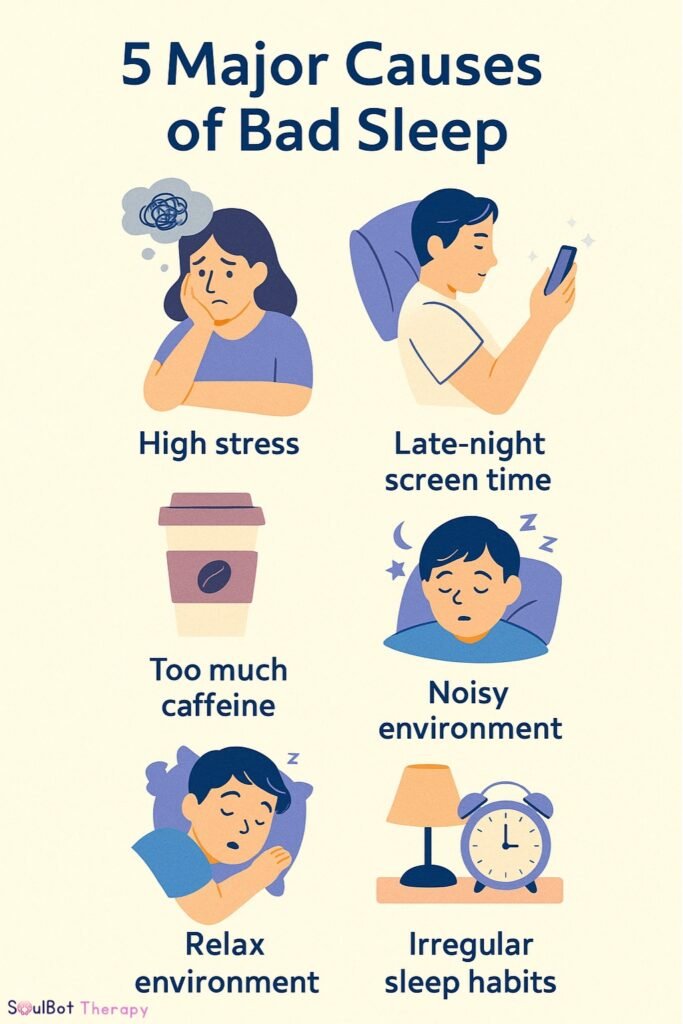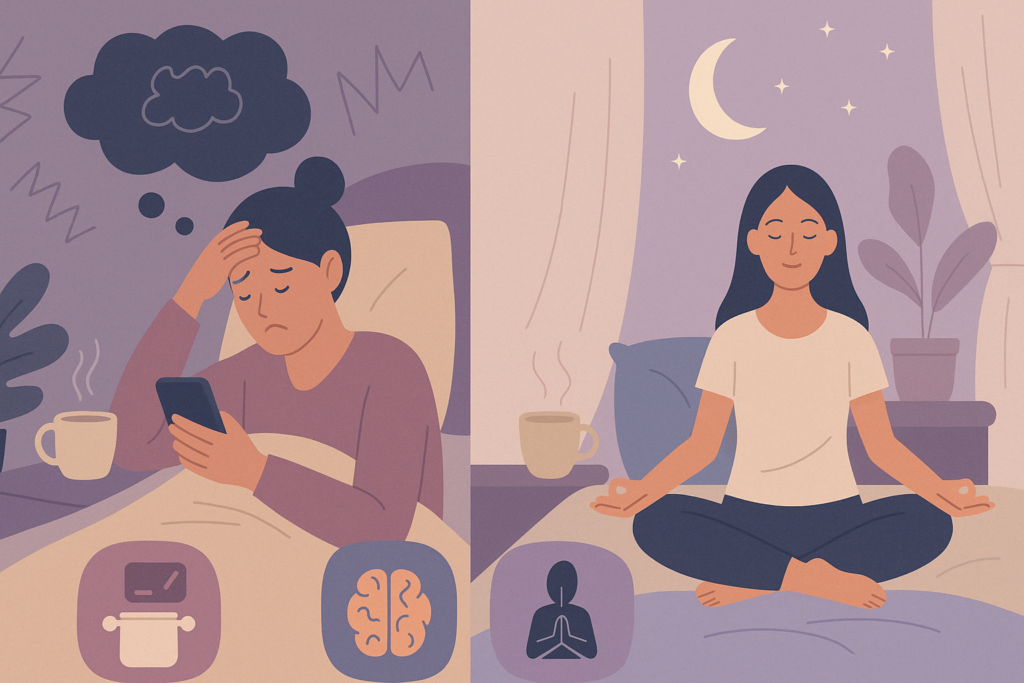If you’re wondering what causes bad sleep, you’re already one step ahead. Sleep struggles aren’t just about caffeine or screen time. Emotional overload, poor habits, and subconscious triggers often cause restless nights.
This blog will uncover the real causes of bad sleep, the science behind disrupted rest, and how to fix them naturally.
Why Understanding the Causes of Bad Sleep Matters
Bad sleep isn’t just about feeling tired.
It affects:
- Mood swings
- Anxiety spikes
- Focus and productivity
- Physical health decline
“Poor sleep habits today create emotional exhaustion tomorrow.”

What Are the Most Common Causes of Bad Sleep?
Let’s break it down clearly and practically:
1️⃣ Doomscrolling and Screen Overload Before Bed
One major cause of bad sleep is overexposing your brain to stimulation before bed.
Phone scrolling, regularly watching intense shows, and arguing online spike your cortisol, the stress hormone.
🔧Quick Fix:
Wind down screens 60–90 minutes before sleeping. Use audiobooks or offline playlists instead.
2️⃣ Bottling Up Emotions Throughout the Day
Unprocessed emotions are a psychological cause of insomnia.
If you’re carrying:
- Guilt
- Shame
- Overwhelm
- Resentment
…it can disrupt deep sleep cycles even if you’re physically exhausted.
🔧Quick Fix:
Try a nightly brain dump: journal feelings, not just to-do lists.
3️⃣ Poor Sleep Habits and Inconsistent Bedtimes
Irregular sleep and wake times cause bad sleep patterns and confuse your internal clock.
Inconsistent habits mean:
- Melatonin release is delayed
- Sleep drive weakens
- Mental fog increases
🔧Quick Fix:
Fix your wake-up time first (within a 30-minute window every day).
4️⃣ Anxiety and Overthinking at Night
A racing mind is one of the top emotional causes of bad sleep.
If you’re lying awake thinking about:
- Past mistakes
- Future plans
- Worst-case scenarios
… it’s no wonder your body resists sleep.
🔧Quick Fix:
Practice “thought labeling”: identify, name, and park thoughts without judgment.
5️⃣ Environmental Sleep Disruptors
Physical triggers like:
- Noise
- Temperature
- Poor mattress quality
- Bright lighting
…are often underestimated causes of bad sleep.
🔧Quick Fix:
Use white noise blackout curtains, and ensure your sleeping space feels emotionally and physically safe.
What is the Impact of Poor Sleep on Your Mind and Body
| Poor Sleep Habit | Mental Health Effect |
|---|---|
| Late-night scrolling | Anxiety and mood swings |
| Emotional suppression | Nightmares and restlessness |
| Skipping evening wind-down | Shallow REM cycles |
| Irregular sleep-wake times | Depression symptoms |
Want to Check If You Have Poor Sleep Patterns?
Take SoulBot’s quick Sleep Quality Test to find out:
- Emotional causes behind your restlessness
- Sleep cycle consistency levels
- Personalized sleep improvement suggestions
🔗 Fact: According to the Sleep Foundation, resetting your sleep schedule naturally involves maintaining a consistent bedtime and wake-up time, limiting screen exposure before bed, and aligning your routine with natural light patterns. These practices help regulate your circadian rhythm and improve sleep quality.
🔗 Related SoulBot Reads
- Signs Your Sleep Struggles Are Affecting Your Mental Health
- How to Reset Your Sleep Schedule (Even If You’re Anxious)
- Why You’re Always Tired (Even After 8 Hours of Sleep)
Final Thought: Healing Sleep Isn’t About Rules — It’s About Rhythm
You don’t “earn” better sleep by working harder.
You create it by listening to what your mind and body need.
Small emotional shifts create significant sleep victories.
or
📞 Book a Free Consultation with SoulBot — and let’s build your better nights together.
🙋♀️ FAQ: Causes of Bad Sleep
What are the emotional causes of bad sleep?
Bottled-up emotions like guilt, shame, and worry overstimulate your brain at bedtime, disrupting sleep naturally.
Can bad sleep habits be fixed without medication?
Yes! Behavioral changes like consistent wake-up times, emotional decompression, and sensory regulation naturally fix most poor sleep habits.
How long does it take to fix destructive sleep patterns?
With consistent habits, you can reset your sleep schedule naturally within 7–14 days.
Why can’t I sleep even though I’m tired?
Unprocessed emotional stress, poor habits, and nighttime anxiety are major psychological causes of insomnia.




